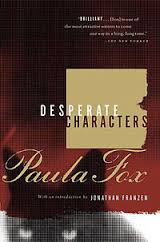
One sizable subset of books I have read this year is in the category ‘books Jonathan Franzen recommends’, (e.g., the wonderful THE MAN WHO LOVED CHILDREN). DESPERATE CHARACTERS is one of these, an out-of-print rarity that makes you glad Amazon is taking over the world, so you can find it. Here’s Franzen on Fox:
Because the book is not long, and because I’ve now read it half a dozen times, I’m within sight of the point at which every sentence will be highlighted as vital and central. This extraordinary richness is, of course, a testament to Paula Fox’s genius. There’s hardly an extraneous or arbitrary word to be found in the book. Rigor and thematic density of such magnitude don’t happen by accident, and yet it’s almost impossible for a writer to achieve them while relaxing enough to allow the characters to come alive, and yet here the novel is, soaring above every other work of American realist fiction since the Second World War.
It’s 156 pages of one weekend in one woman’s life. The main action is her getting bitten by a cat. Yet somehow, I agree with Franzen: it’s about so much more, I can’t quite describe it. It’s about middle class guilt; about making a success of marriage; about urban blight; about failure; also, tangentially, about rabies. I can’t pretend Fox doesn’t crush it. Here’s a flavour –
On an old friend:
And she liked his somewhat battered face, the close fitting English suits he bought from a London salesman who stopped at a mid-town hotel each year to take orders, the Italian shoes he said were part of his seducer’s costume. He wasn’t a seducer. He was remote. He was like a man preceded into a room by acrobats.
. Or this, where the main character is thinking about a man she had an affair with:
She put herself to sleep again, nursing memories of Francis Early, like an old crone with a bit of rag for a baby
. Or here, the family of her caretaker:
Sitting around the kitchen table like collapsed sacks of grain were Mrs Hayes and the three Hayes children
And yet somehow I couldn’t quite enjoy it. Or rather I enjoyed it till page 155 of 156, after which I was like: what? It doesn’t end so much as stop. Someone throws an ink bottle at a wall, and that’s it. It may be that I am intellectually limited and irretrievably ensnared in the Victorians, but I just can’t bear it. I appreciate that this is what real life is like, that nothing resolves, and that this is the very cutting edge of literature, but I just can’t get behind it. I like my novels to at least gently indicate in the direction of meaning. Paula Fox is too tough for that. So I admire it, but somehow I can’t quite like it. And yet I admire it hugely: so much so that the fact that it is out-of-print strikes me as indicative of end-of-days, almost as much as the election of President Trump
